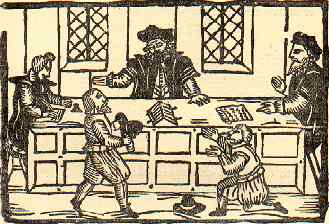Trial
If Falstaff were indicted for felony, he would then be "arraigned" before the court*, where prisoners were called to the bar to hear the indictment against them and enter a plea: "guilty" or "not guilty." Either way, it was crucial that the accused formally acknowledge himself or herself to be tried "By God and the country"--failure to say these words or to enter a plea would result in automatic conviction*.
Witnesses for the Crown and the defence gave testimony in turn, presenting evidence which could include hearsay. If Falstaff's accomplices (Bardolph perhaps) were also in custody, one might have been pardoned in return for testifying against the chief offender, thereby "turning King's evidence."
And the verdict is?
The jury then considered the indictments brought before them, perhaps retiring to an adjacent room under the watch of a jury bailiff (who prevented outside interference). Juries took no longer than a few hours at most to deliberate over the verdicts; thus no trial lasted more than a day.
If the jury decided on an acquittal, Falstaff might still be bound over to good behaviour or sent to a house of correction. False acquittals and "partial verdicts" were commonly used to allow a less harsh punishment than was called for by the penal code*.
Footnotes
-
The venue
Felonies committed in the environs of London would be tried at King's Bench or at a session of the peace held at Newgate (the "Old Bailey") or the Guildhall.
-
Harsh penalites
According to a statute of 1275 still in force, prisoners so convicted were sentenced to be half-starved and pressed to death. But it was a rare judge who carried out this law to the letter; methods were used to coerce a plea if necessary. By staying mute, the accused hoped to protect his or her dependants from the forfeiture of property.
-
Getting off easily
About half of those indicted were given an acquittal, and 75% of those convicted of felony escaped hanging. However, if the judge was unsatisfied with the verdict, he could bring an action of attaint against the jury, fining the jurors or requiring them to appear in Star Chamber. Judges could also refuse to accept a verdict, and some coached the jurors beforehand (particularly under James I).
